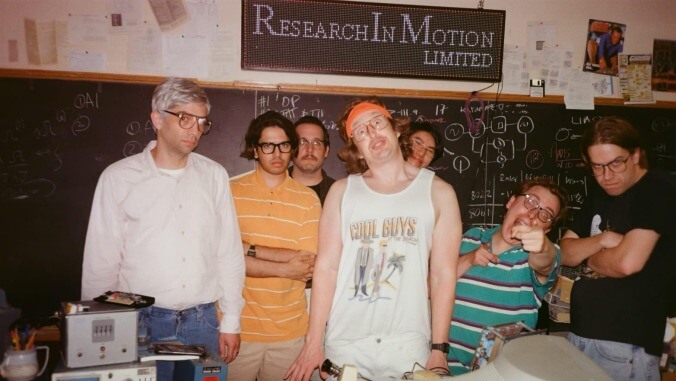BlackBerry review: how a tech revolution became a geek tragedy
Jay Baruchel and Glenn Howerton deliver engaging performances in this entertaining tale about the rise and fall of a smartphone pioneer

Technology delivers all types of incredible societal advances. But the mad-dash nature of Western capitalism and the emotional fitfulness of the consumer marketplace also creates graveyards of arriviste empires—faddish companies with a product or service that intersects heavily with a particular moment in time, but ends in the type of mismanaged disaster only fully understood postmortem. BlackBerry, directed by multi-hyphenate Matt Johnson, is an engaging new film that charts the incredible rise and spectacular flameout of its titular product, the world’s first smartphone—which, for a period of time, controlled 45 percent of the cell phone market and seemed unstoppable as a cultural force.
Spinning off Jacquie McNish and Sean Silcoff’s nonfiction book Losing The Signal, Johnson and co-screenwriter Matthew Miller invest heartily in the story’s personalities. But instead of reverence or preciousness, they frame BlackBerry as an oddball workplace dramedy about industry gate-crashers rudely ejected from a party of their own staging.
The film opens in 1996 in Ontario, where Mike Lazaridis (Jay Baruchel) oversees a software firm known as Research in Motion which operates like a social club as much as a business. Its culture of immaturity is embodied most robustly by headband-sporting co-founder Douglas Fregin (Johnson again), and the importance of collecting on money contractually owed seems on par with communal video game sessions.
Into this den of juvenilia steps Jim Balsillie (Glenn Howerton), who talks himself into a job as CEO. He quickly recognizes Lazaridis’ value as an inventor and fast-tracks an aggressive plan for a fanciful prototype that will leverage existing data networks and allow customers to quickly access email from their mobile devices. BlackBerry, the product, is a smash hit, and quickly becomes a market leader.
In an act seemingly designed to overtly terrorize his employees, Balsillie brings in as COO Charles Purdy (Michael Ironside), a scowling taskmaster who cancels movie night and derides workers as “little children playing with their little penises.” Balsillie’s strategic disengagement enables him to outmaneuver a takeover bid by Palm, Inc. CEO Carl Yankowski (Cary Elwes, in a small cameo that could stand to be fleshed out) and grow the company even more.
At around the 75-minute mark, the movie jumps forward to 2007, as Apple prepares the launch of its iPhone. While Lazaridis fiddles around with adjusted trackpads for the BlackBerry Bold, other dodgy deals and past corners cut come back to haunt the company, contributing to a fatal down swirl.
BlackBerry admirably shrinks the aperture of its story’s technical elements, and eschews the shrewd social inventorying or scrupulous myth-making that Aaron Sorkin brought to The Social Network and Steve Jobs. While the lack of a bigger look at the global mania the “Crackberry” wrought sometimes feels reductive, the characters here are interesting enough for the most part to acquit the tradeoff.
 Keep scrolling for more great stories.
Keep scrolling for more great stories.
